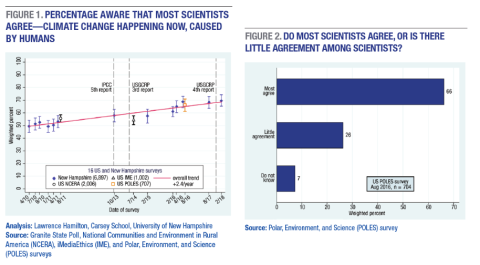download the brief
Key Findings


Public awareness of this scientific consensus is gradually rising.
Among scientists who study the Earth’s climate, there is overwhelming agreement that humans are causing rapid change.1 Surveys find that the U.S. public underestimates the extent to which scientists agree on this point,2 but public awareness is gradually rising (Figure 1). A repeating question placed by Carsey School researchers on surveys since 2010 asks:
Which of the following two statements do you think is more accurate?
- Most scientists agree that climate change is happening now, caused mainly by human activities.
- There is little agreement among scientists whether climate change is happening now, caused mainly by human activities.
Figure 1 tracks what percentage answered accurately that most scientists agree, and shows an upward trend averaging about 2.4 points per year.3 On the nationwide Polar, Environment, and Science (POLES) survey conducted in August 2016, for example, 66 percent said they thought that most scientists agree. Only 26 percent thought there is little agreement, and 7 percent said they do not know (Figure 2). New Hampshire responses generally are within a few points of the nationwide surveys,4 as is often the case with climate-change topics.5
Publication of major scientific reports that synthesized work by thousands of scientists, such as those from the Intergovernmental Panel on Climate Change in 2013,6 or U.S. Global Change Research Program in 2017,7 are not followed by sudden moves in the graph. Such reports, along with countless individual studies by scientists across many disciplines, contributed in a more gradual way to growing public awareness of the scientific consensus.

Endnotes
1. J. Cook, N. Oreskes, P.T. Doran, W.R.L. Anderegg,
B. Verheggen, E.W. Maibach, J.S. Carlton, S. Lewandowsky, A.G. Skuce, S.A. Green, D. Nuccitelli, P. Jacobs, M. Richardson, B. Winkler, R. Painting, and K. Rice, “Consensus on consensus: A synthesis of consensus estimates on human-caused global warming,” Environmental Research Letters 11(4) (2016), doi:10.1088/1748-9326/11/4/048002.
2. A. Leiserowitz, E. Maibach, C. Roser-Renouf, S. Rosenthal, and M. Cutler, Climate change in the American mind: May 2017, Yale University and George Mason University, New Haven, CT: Yale Program on Climate Change Communication (2017), http://climatecommunication.yale.edu/publications/climate-change-americ….
3. The upward trend of about 2.4 points per year is statistically significant (p < 0.001), tested using robust statistical methods suitable for these mixed data.
4. L.C. Hamilton, “Public awareness of the scientific consensus on climate,” Sage Open (2016), doi: 10.1177/2158244016676296.
5. L.C. Hamilton, J. Hartter, M. Lemcke-Stampone, D.W. Moore, and T.G. Safford, “Tracking public beliefs about anthropogenic climate change,” PLOS ONE 10(9):e0138208 (2015), doi: 10.1371/journal.pone.0138208.
6. Intergovernmental Panel on Climate Change, Climate Change 2014: Synthesis Report, http://www.ipcc.ch/report/ar5/syr/.
7. U.S. Global Change Research Program, Climate Science Special Report: Fourth National Climate Assessment (NCA4), Volume I (2017), https://science2017.globalchange.gov/.
Acknowledgements
Climate questions on the Granite State Poll have been supported primarily by the Carsey School of Public Policy and the Sustainability Institute at the University of New Hampshire, with some assistance from the National Science Foundation (New Hampshire EPSCoR grant EPS-1101245). Support for the POLES survey was provided by the PoLAR Partnership grant from the National Science Foundation (DUE-1239783). Princeton Survey Research Associates conducted the iMediaEthics survey; NCERA was conducted by the UNH Survey Center under a grant from the Ford Foundation. Any opinions, findings, and conclusions expressed in this material are those of the author and do not necessarily reflect the views of the National Science Foundation or other sponsors.